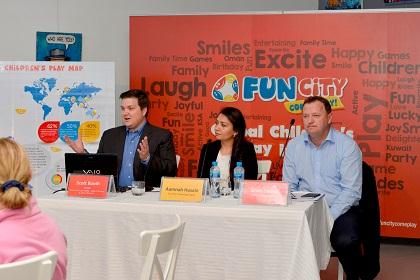
Fun City, the family entertainment centre – part of Landmark Leisure, the entertainment division of Dubai-based retail conglomerate Landmark Group – has announced the fourth edition of Fun City Children’s Play Index including research data from the UK, Australia, Sweden, Singapore and China in addition to the regional countries of the UAE, Oman, Bahrain and Qatar.
This global index result positioned the UAE on top regionally as the best country with positive play habits in children belonging to three age groups – 2-5 years, 6-8 years and 9-12 years old. Globally, it ranks third in the 9-12 year bracket and fourth in 2-5 and 6-8 age groups.
This ranking in the age group 9-12 years highlights the impressive effort and work by the government illustrating a clear focus in spreading nationwide positive awareness about the importance of play for children’s overall development in the UAE by bringing about a balance between scholastic and leisure activities.
The combined index score for the surveyed GCC countries for the three age groups of 2-5, 6-8 and 9-12 is 57 and 45 for 6-8 and 9-12 years old, thereby mapping a healthy increase in play patterns amongst all age groups of children compared to last year, in addition to its comparison with the surveyed international countries which have collectively ranked 57 for 2-5 years old, 55 for 6-8 years old and 47 for 9-12 years old.
The fourth edition of the play index has been extended to global territories in an endeavour to understand children’s play behaviour, social factors and the curricular mandates adopted in these globally advanced countries, resulting in a robust and scientific benchmark that experts, professionals and parents can refer to for the improvement of their families and society in general.
The index has been computed based on scientifically concluded qualitative inputs from nine psychologists and school counselors, weighing the significance of activities undertaken by children from different age groups and their related impact on children’s development translated in “influencing powers,” in addition to the quantitative data of play time activities that were analysed form more than 2,235 mothers of children between 2-and-12 years of age residing in the UK, Sweden, Singapore, China, Australia, the UAE, Qatar, Bahrain and Oman.
This community awareness initiative by Landmark Leisure reinforces the importance of play and its benefits on the well-being and happiness of children. It’s in line with the UAE’s mission of achieving a happier society, as stated during the recently held World Government Summit where the platform of “Play to Learn” is to be explored for the aim to develop better experiences for generations to come.
“Fun City’s faith and devotion in creating incomparable play opportunities for the happiness and better development of children in our regional societies has prompted us to plunge into international ones with this fourth edition and have a clear ranking on the Play Index for our region mapped with global territories. This ranking does not only provide a comparative but it also evidently throws up areas of improvement and opportunities of merging play more frequently in the daily lives of our children from early childhood periods,” says Silvio Liedtke, COO, Landmark Leisure.
Commenting on the research findings, Aamnah Husain, qualified psychologist and parenting expert to Fun City, adds, “I’m honoured to be part of this initiative that prompted a huge social awareness and change towards one of the most basic and essential needs of a child – play. The fourth edition of the Fun City Children’s Play Index brings in lots of knowledge and clarity to parents as it is drawing parallels and contrasts between children’s lifestyle and play activities in our region and those from other countries in Asia, Europe and Australia.”
“I am also glad to see that the amount of active play children in the region enjoy, competing with the developed countries, especially physical play, creative play and social entertainment. Digital gaming seems to be one of the most coveted activities amongst children and for that I emphasise on the need for parental control and supervision in this area,” she elaborates.
The index follows the Erikson’s stages of psychosocial development based on three age groups (2-5, 6-8 and 9-12) and assesses fundamental play activities in a child’s regular day such as the total amount of their days’ free time spent in playtime activities, the split of playtime among different recreational activities among physical play habits, active play habits, passive play habits, popular playing activities and technology based mediums of play.
Fun City Children’s Play Index was first instituted in 2012 in the UAE, later merging Qatar, Oman and Bahrain. With significant additions year-on-year, the current edition has encompassed global territories in its research and computation.